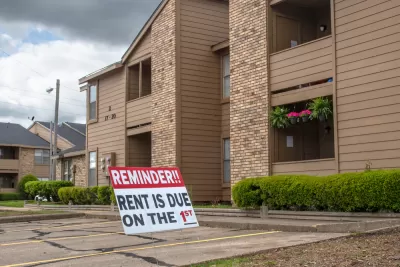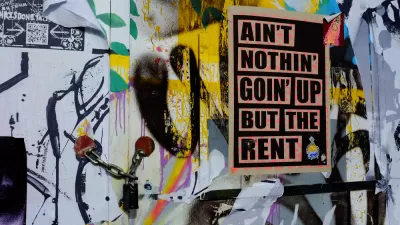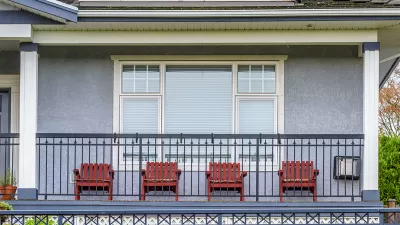The differences between the haves and the have-nots, already apparent in the U.S. housing market before the pandemic, is more apparent than ever after more than a year of economic and demographic upheaval.

The Harvard Joint Center for Housing Studies (JCHS) released its "The State of the Nation's Housing 2021" report on Wednesday—the latest version of the closely watched and frequently cited annual report that identifies major themes and trends in the U.S. housing market.
This year's report tells a story of a nation split by the consequences of the COVID-19 pandemic—a year after stay-at-home orders shut down massive sections of the country's economy, leaving many renters and homeowners without the income to pay their bills.
Here's how a JCHS press release [pdf] summarizes the findings of the report:
As the US economy continues to recover from the effects of the pandemic, households that weathered the crisis without financial distress are snapping up the limited supply of homes for sale, pushing up prices and further excluding less affluent buyers from homeownership. At the same time, millions who lost income are behind on housing payments and on the brink of eviction or foreclosure.
Moreover, according to the press release, "a disproportionately large share of at-risk households are those with low incomes and people of color."
As for the risks facing renters who have fallen behind on rent, the report increases the most recent estimates of the Census Bureau by increasing the number of renters behind on payments from 7 million to 14 million. "As a result of widespread income losses during the pandemic, 14 percent of all renter households were behind on their housing payments in early 2021, and in ten states, more than one-fifth of renters were in arrears," according to the press release.

"Racial disparities are evident here as well, with 29 percent of Black, 21 percent of Hispanic, and 18 percent of Asian renters in arrears, compared with just 11 percent of white renters."

Articles sharing the news of the "State of the Nation's Housing 2021" report includes a post by Enterprise Community Partners, which summarizes the findings of the report as follows:
The report makes particular note of the divergent trends among for-sale versus for-rent markets, with the former experiencing soaring prices amid historic supply shortages, while the latter grapples with billions in back rent owed and the growing risk of an eviction crisis among renters who lost income during the pandemic.
Two additional articles, by the Associated Press and Bloomberg CityLab, package the JCHS report with similarly sobering data released recently by the National Association of Home Builders (NAHB). In the article for Bloomberg CityLab, Patrick Sisson describes the current state of the housing market in the United States as doubling down on the same trends that created the housing affordability crisis that pre-dated the pandemic, and has only worsened since then.
FULL STORY: The State of the Nation’s Housing 2021

Alabama: Trump Terminates Settlements for Black Communities Harmed By Raw Sewage
Trump deemed the landmark civil rights agreement “illegal DEI and environmental justice policy.”

Study: Maui’s Plan to Convert Vacation Rentals to Long-Term Housing Could Cause Nearly $1 Billion Economic Loss
The plan would reduce visitor accommodation by 25% resulting in 1,900 jobs lost.

Planetizen Federal Action Tracker
A weekly monitor of how Trump’s orders and actions are impacting planners and planning in America.

Wind Energy on the Rise Despite Federal Policy Reversal
The Trump administration is revoking federal support for renewable energy, but demand for new projects continues unabated.

Passengers Flock to Caltrain After Electrification
The new electric trains are running faster and more reliably, leading to strong ridership growth on the Bay Area rail system.

Texas Churches Rally Behind ‘Yes in God’s Back Yard’ Legislation
Religious leaders want the state to reduce zoning regulations to streamline leasing church-owned land to housing developers.
Urban Design for Planners 1: Software Tools
This six-course series explores essential urban design concepts using open source software and equips planners with the tools they need to participate fully in the urban design process.
Planning for Universal Design
Learn the tools for implementing Universal Design in planning regulations.
Caltrans
Smith Gee Studio
Institute for Housing and Urban Development Studies (IHS)
City of Grandview
Harvard GSD Executive Education
Toledo-Lucas County Plan Commissions
Salt Lake City
NYU Wagner Graduate School of Public Service





























